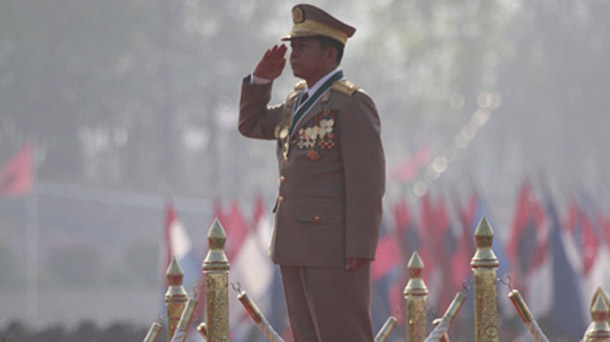RANGOON — Commander-in-Chief Min Aung Hlaing has reportedly said that Burma’s powerful military has only ever acted defensively in the country’s internal conflicts and he cast the blame for any violence on ethnic armed groups. He also warned that the military is “afraid of no one.”
Leaders of ethnic armed groups on Tuesday objected to the remarks and said they could hinder nationwide ceasefire negotiations with the government.
Min Aung Hlaing’s statements were published on Monday in local newspaper True News and the article was later shared on the official Facebook page of Burmese-language government newspaper The Mirror. True News said the remarks were made in the Operation Meeting Room of the Office of the Commander-in-Chief in Naypyidaw on Nov. 29, when the commander addressed a group of officers who had completed a training course. The paper said it had obtained the transcript of Min Aung Hlaing’s speech.
In the strong-worded speech, Min Aung Hlaing addressed the government’s ongoing ceasefire talks and the conflict in northern Burma, where the government and the Kachin Independence Army (KIA) have failed to come to a ceasefire agreement despite several rounds of talks last year.
Fighting in Kachin broke out in 2011 and intensified in late 2012, when the army successfully encircled the KIA headquarters in Laiza through the use of heavy firepower, including fighter jets, to pound the lightly-armed guerrillas.
Min Aung Hlaing issued a blanket defense of the military’s operations, saying any operation was necessitated by the actions of ethnic insurgents.
“Our troops will never attack first. But, they cannot destroy the peace of the country or the administration of the government. We cannot tolerate it if people are hurt. And also, we cannot remain tolerant if they destroy roads and transportation important to security. This is unacceptable,” he said.
Speaking about the 14 ceasefire agreements that Thein Sein’s government has signed with armed groups since 2012, Min Aung Hlaing said, “We made peace agreements, but that doesn’t mean we are afraid to fight. We are afraid of no one. There is no insurgent group we cannot fight or dare not to fight.”
“We want to have a successful peace process. A successful peace agreement could not be reached in the past because there was a military government at that time,” Min Aung Hlaing said, without elaborating.
In recent months, government negotiators and military commanders have convened with all major ethnic armed groups for talks on a nationwide ceasefire agreement, but the negotiations have produced no accord yet.
Both sides have tentatively planned to hold another round of talks in the Karen State capital Hpa-an later this month.
Leaders of the United Nationalities Federal Council (UNFC), an alliance of Burma’s 12 largest ethnic armed groups, said they were dismayed by Min Aung Hlaing’s remarks.
“I read his speech and I feel he has threatened our ethnic armed forces and even challenged us, while we are working to have nationwide peace with them [the government],” said Nai Hong Sar, chairman of the New Mon State Party and a leading UNFC member.
“It is sad to still see such of mindset of the military leader and this warns us we need to be careful,” he said in an interview on the sidelines of a UNFC workshop in Chiang Mai, northern Thailand.
KIA deputy chief Gun Maw said he wondered why a strong-worded speech by Min Aung Hlaing from November was released now, a few weeks before the start of another round of nationwide ceasefire talks.
“He gave an internal speech for the military, but we have to seriously consider why his speech was made public. We need to analyze why they intended to let the public and the ethnic armed groups know this [speech],” he said.
In his November speech, Min Aung Hlaing also vowed to continue retired strongman Than Shwe’s policy for the development of the military.
“I will forever follow the policy laid down by Snr-Gen Than Shwe. The four points of this policy are mainly to build up our armed forces,” said Min Aung Hlaing. “The first point is military training, the second is military command. Third is social welfare for [members of] the army. Four, the military should have a strong spirit,” he said.
From the early 1990s until 2011, Than Shwe headed the military government until he retired and appointed President Thein Sein to lead a quasi-civilian government.
During his reign, the government brutally suppressed calls for democracy, but Than Shwe is said to have planned current democratic reforms as part of a roadmap that includes free and fair elections in 2015. Despite such changes, the military retains much political power and directly controls a quarter of all parliamentary seats.
Min Aung Hlaing said the military deserved praise for the democratic reforms. “These reforms were not made because of pressure from the international community. The army created the first road to democracy,” he said, adding that the poor state of Burma’s economy after decades of military rule was the fault of ethnic armed insurgents.
“Burma remains behind in development in the world because of internal insurgents who caused conflict in the country. Different governments tried to end the fighting, but could not find a solution,” he said.
Correction: The story wrongly reported that Min Aung Hlaing’s statements were published by The Mirror newspaper. The remarks were in fact published in local newspaper True News on Jan. 14, 2013. This was corrected on Jan. 16.

















